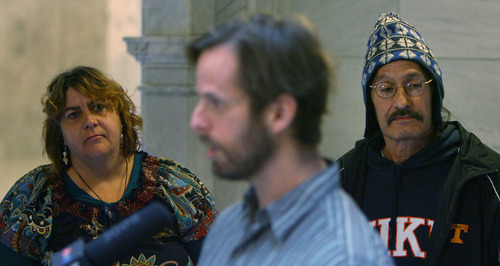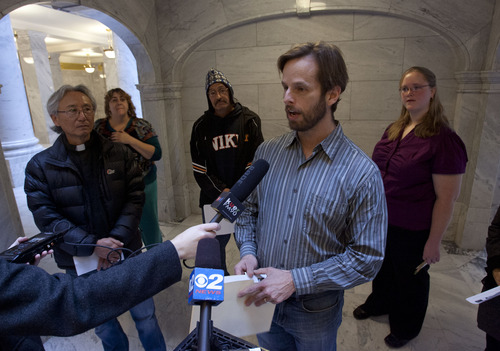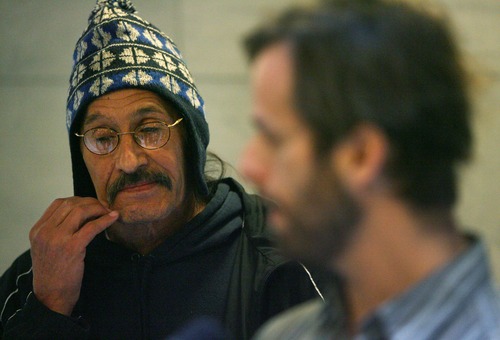This is an archived article that was published on sltrib.com in 2012, and information in the article may be outdated. It is provided only for personal research purposes and may not be reprinted.
Salt Lake City resident Jackie Sanchez, 56, battled homelessness for seven years and now has secure subsidized housing. However, he has no health insurance, and his only option for medical care is the Fourth Street Clinic, which most often serves homeless and low-income Utahns.
Sanchez is one of thousands in Utah who live below the federal poverty level and either forgo health care or skip meals in order to access low-cost medical attention.
More than 100,000 Utahns in poverty could be insured if the state opts into the Medicaid expansion available under the federal Affordable Care Act, said Bill Tibbitts, associate director of the nonprofit Crossroads Urban Center.
Tibbitts and other low-income advocates delivered the results of a recent survey Friday to Gov. Gary Herbert's office with hopes that he will include Medicaid expansion in his new budget, which is due in December.
The survey, conducted last week, queried 312 Crossroads clients and found that many either skipped meals to pay for medical care and prescriptions — or went without health care completely because they could not afford it.
Of those interviewed, 34 percent had no insurance and 86 percent reported either skipping meals or visiting food pantries in order to pay for basic health care. The same percentage said they sometimes went without medical care because the costs were out of reach.
Only 5 percent said they had private health insurance, compared to 65 percent of Utah's overall population who are insured.
Even among the low-income population that is insured, 76 percent reported visiting food pantries or skipping meals in order to pay for basic health care, and seven in 10 had to forgo medical attention due to a lack of funds.
More than 70 percent reported receiving collection calls concerning outstanding medical bills.
"For the people we serve, a $10 co-payment means you go to the food bank for food that month," Tibbitts said. Crossroads operates an emergency food pantry that serves about 200 people every day, he said, and the center reported serving a traditional Thanksgiving meal last week to almost 7,000 people.
Sophie Bedillion, 45, was homeless for about six months before getting into housing. A film student at Salt Lake Community College, Bedillion battles several health problems that include neuropathy, depression, hypothyroidism and asthma. She isn't considered disabled and doesn't currently qualify to receive Medicaid, but she could use the help for treatment costs.
"Sophie's story shows why the Medicaid expansion is so important," Tibbitts said.
Lou Anne Stevenson, volunteer receptionist for Crossroads and member of its Anti-Hunger Action Committee, said she often encounters people with diabetes or cancer who are homeless.
"The only help they've got is the Fourth Street Clinic," Stevenson said. "I don't know how they manage to stay alive."
The lack of income and insurance leads to increased suffering, Tibbitts said, a circumstance that Medicaid expansion could ease by covering everyone who is currently eligible for food stamps.
The expansion is scheduled to start Jan. 1, 2014. In Utah's legislative session that launches Jan. 28, 2013, Herbert and state lawmakers will decide whether to fund it.
Herbert was not on hand Friday to receive the group's comments directly, but a spokesman for his office, Nate McDonald, said the information would be placed in a constituent services file for review at a later date.
cmckitrick@sltrib.com Twitter: @catmck —
Tough choices: Medical care or food?
In Utah, 14 percent of the population lacks health insurance, while 65 percent are privately insured.
However, for those living below the federal poverty level, 34 percent lack insurance and only 5 percent are privately insured. Of that group, three out of four of those with insurance skip meals to afford health care or forgo medical care completely because they can't afford it; close to nine in 10 without insurance do the same.
Sources: Kaiser Family Foundation, Crossroads Urban Center Survey







